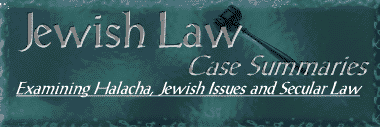

Case Summaries
-- Miscellaneous
Miscellaneous
- Subin v. Goldsmith
- Maimonides quoted at page 761
224 F.2d 753 (2nd Cir. 1955)
- Garrity v. New Jersey
- Cites Lamm, "The 5th Amendment and Its Equivalent in Jewish Law, 17 Decalogue Journal (Jan.-Feb. 1967) re: Halacha and self-incrimination
385 U.S. 493, 497 n.5 (1967), 87 S. Ct. 616, 619 n.5
- Wilson v. Beame
- Obligation of prayer with minyan discussed at page 1239
380 F.Supp. 1232 (E.D.N.Y. 1974)
- Application of Juan R.
- "It is not unreasonable to assume" that the "thirteen principles enumerated by Rabbi Ishmael" played a major role in the development of common-law, and therefore a "kal v'chomer" (judge's words) could be applied to enactment of legislature.
374 NYS2d 541, 84 Misc2d 580 (Fam. Ct. Kings County, 1975)
- Charles J. Miller, Inc. v. McLung-Logan Equip.
- Maimonides quoted at page 1155
329 A.2d 1153 (App. Md. 1978)
- People v. Jackson,
- Trial court erred in not adjourning court on a Friday until the following Monday in order to accommodate a Sabbath Observant Juror; nonetheless, replacement by the alternate juror was not sufficient harm to overturn the conviction.
149 A.D. 2d 532, 539 N.Y.S. 2d 997 (Second Dept. 1989)
- Estep v. Dent,
- Making a prisoner shave off his side locks (peyot/peyos) violates RFRA.
914 F. Supp. 1462 (W.D. Ky. 1996)
- United States v. Somerstien,
- Batson challenge excluded Jews from case against kosher caterer; Held: Jews are a race and can be subject to a Batson challenge but no evidence here that they were excluded because they were Jewish.
1997 WL 174197 (E.D.N.Y.)
- Cohn-Frankel v. United Synagogue of Conservative Judaism
- Teenager who joined summer tour for Jewish children and who communicated her belief in Christianity to the other children and to tour counselors did not have a cause of action for intentional infliction of emotional distress when she was expelled from the tour.
246 A.D.2d 332, 667 N.Y.S.2d 360 (N.Y. App. Div. 1st Dept. 1998). Dated January 8, 1998.
- Jews For Jesus v. Brodsky
- Preliminary injunction granted to "Jews for Jesus an organization engaged in Christian missionary activity, so as to prevent defendant, an opponent of plaintiff’s work, from maintaining an Internet Web site titled "jewsforjesus.org"; application of laws governing trademarks and unfair competition
993 F. Supp. 282 (D. N.J. 1998), Civil Action No. 98-274 (AJL). Dated March 6, 1998. Opinion by J. Lechner.
- Hack v. The President and Fellows of Yale College
- Yale College denied plaintiffs, Orthodox Jewish freshmen and sophomores, the right to reside off campus, even though they objected on religious grounds to being required to reside on campus in co-educational residence halls; claim under 42 U.S.C. § 1983 for violation of plaintiffs’ free exercise of religion dismissed as Yale was not acting under color of state law; plaintiffs did not have standing to sue under the federal Fair Housing Act and they did not state a cause of action under the Sherman Antitrust Act; all federal claims having been dismissed, the court refused to entertain the remaining state law claims for breach of contract and unjust enrichment.
16 F. Supp. 2d 183 (D. Conn. 1998), Civil No. 3:97CV02212 (AVC). Dated July 31, 1998. Opinion by J. Alfred V. Covello.
- Korablina v. Immigration and Naturalization Service
- Immigration; evidence compelled a finding of past persecution and a well-founded fear of future persecution against Ukrainian Jew.
158 F.3d 1038 (9th Cir. 1998), No. 97-70361. Dated October 23, 1998. Opinion by J. Trott.
- Classen v. Ashkinazy
- Plaintiff counsel's remarks in the summation to a dental malpractice action analogizing the Jewish wedding custom of breaking a glass to the destruction of trust between plaintiff and defendant in their dentist-patient relationship was not an improper reference to defendant=s race, nationality or religion.
686 N.Y.S.2d 164 (N.Y. App. Div. 1999). Dated February 25, 1999. Opinion by J. Mikoll.
- Lightman v. Flaum
- Unauthorized disclosure during child custody dispute of wife's confidential communications to Rabbis concerning relationships with other men and her cessation of the observation of religious laws of ritual purity following menses so she would not have to engage in sexual relations with her husband violated clergy-penitent privilege unless made in the presence of third persons; such disclosure subjected Rabbis to action in damages, both for violation of the privilege and for intentional infliction of emotional distress; however, Rabbi's statements in an affidavit submitted to the court in the context of a marital proceeding to determine temporary child custody were privileged and action in defamation had to be dismissed; New York law.
, 179 Misc. 2d 1007, 687 N.Y.S.2d 562 (N.Y. Sup. Ct. 1999), Index No. 2169/97. Dated March 4, 1999. Opinion by J. David Goldstein.
Copyright © 1997-2008 by Ira
Kasdan. All rights reserved.
DISCLAIMER